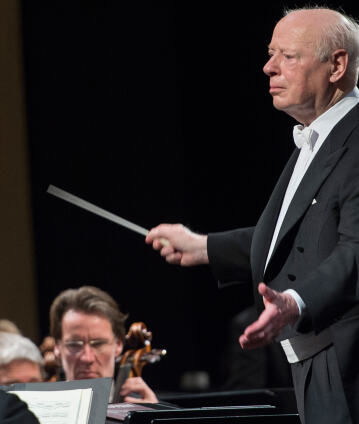Bernard Haitink conducts Mozart and Bruckner

It’s always a magic moment for Bruckner fans when Bernard Haitink conducts. In this concert, the programme consists of the work with which Bruckner bade farewell to the world: his Ninth Symphony, dedicated “to the beloved God”. Till Fellner debuts as the soloist in Mozart’s gentle and melancholy Piano Concerto K. 503. A free, singing pianistic tone is ensured, as is acute, precise musical modulation.
He is regarded as modest, profound and completely at the service of the music – with his unpretentious, earnest manner, Till Fellner has played his way into the league of the great pianists of our time. In 2011 at a Philharmoniker chamber concert, the student of Alfred Brendel performed piano trios by Haydn and Beethoven together with violinist Corey Cerovsek and cellist Adrian Brendel, and already then established himself as a specialist for the music of the First Viennese School. Here, he makes his debut in orchestral concerts of the Berliner Philharmoniker with the Piano Concerto in C major K. 503 which Wolfgang Amadeus Mozart composed for one of his concert performances in the Advent season in 1786. The first movement of the work is unusually long for that era, and is characterised by a complex, symphonic approach that extends far beyond the concert form customary at the time.
An old hand with the Philharmoniker is at the young pianist’s side: Bernard Haitink is a guest conductor who has worked together with the orchestra since 1964 on a regular and frequent basis. He has repeatedly placed Anton Bruckner’s symphonies on his concert programmes. Like virtually no other practitioner of his craft, Haitink understands how to organise the vast masses of sound of these works, and to build up the tremendous cumulations of this music convincingly and stirringly. He last performed the Fourth here, known as the Romantic, in March 2014.
The Austrian composer’s ninth and last symphony was played with the Philharmoniker only once under his direction, namely in 1989. This work, dedicated by Bruckner “to the beloved God”, remained unfinished. When he died, the composer left behind only three completed movements and extensive sketches for the Finale. This symphony is reminiscent of Beethoven’s Ninth not only because of the key of D minor; like it, the first movement of Bruckner’s work begins quasi from an archaic source, ultimately creating a musical world that opened the gates to the modern era.
© 2015 Berlin Phil Media GmbH
Related interviews
Artists
Our recommendations
- Bernard Haitink conducts Mahler’s Second Symphony
- Bernard Haitink conducts Beethoven and Wagner
- Bernard Haitink conducts Bruckner’s Fifth Symphony
- The 1999 Europakonzert in Krakow with Bernard Haitink, Emanuel Ax and Christine Schäfer
- Bernard Haitink conducts Mahler’s Seventh Symphony
- Bernard Haitink conducts Mozart and Bruckner